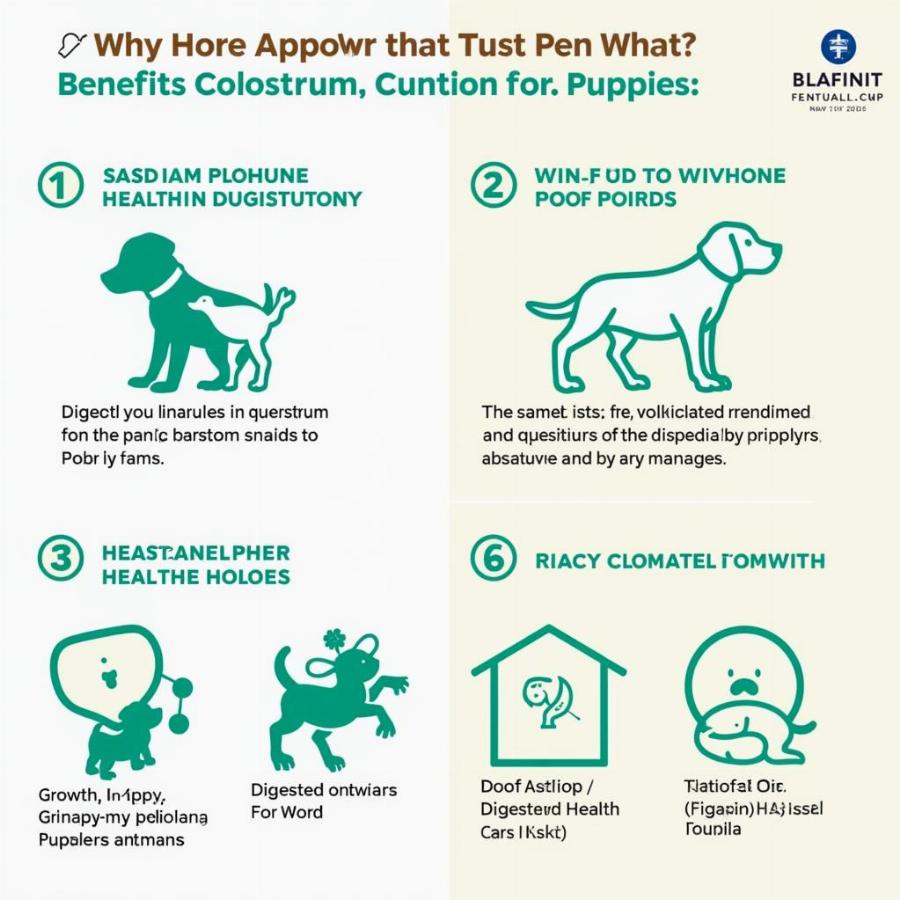Colostrum is a thick, yellowish milk-like fluid produced by mammals, including dogs, immediately after giving birth. Often referred to as “first milk,” colostrum is a vital source of nutrients and antibodies essential for a newborn puppy’s health and development. Unlike regular dog milk, colostrum boasts a concentrated blend of proteins, vitamins, minerals, and disease-fighting antibodies that provide passive immunity and protect vulnerable puppies from infections.
Why is Colostrum So Important for Puppies?
Newborn puppies are born with immature immune systems, making them highly susceptible to infections. Colostrum acts as a critical first line of defense by providing a concentrated dose of antibodies, also known as immunoglobulins, that help fight off viruses and bacteria.
The most crucial antibody in colostrum is IgG (immunoglobulin G), which provides targeted protection against specific diseases. These antibodies coat the puppy’s gut lining, preventing harmful pathogens from entering the bloodstream. This passive immunity is particularly crucial during the first few weeks of life, as puppies gradually develop their own immune systems.
 Colostrum Benefits for Puppies
Colostrum Benefits for Puppies
Beyond its immunity-boosting properties, colostrum is also a powerhouse of nutrients, boasting high concentrations of:
- Proteins: Essential building blocks for tissue growth and repair
- Vitamins: Support various metabolic functions and overall development
- Minerals: Contribute to healthy bone development, nerve function, and more
- Growth Factors: Promote cell growth and development
How Long Do Puppies Need Colostrum?
A puppy’s ability to absorb the antibodies in colostrum diminishes rapidly after birth. Ideally, puppies should receive colostrum within the first 12 hours of life for optimal absorption. During this critical period, their gut lining allows for the passage of antibodies directly into the bloodstream. After 24 hours, the gut “closes,” significantly reducing antibody absorption.
While the first 12-24 hours are the most critical, puppies benefit from receiving colostrum for as long as the mother produces it, typically for the first 2-3 days after birth.
What If a Puppy Doesn’t Receive Enough Colostrum?
Puppies deprived of adequate colostrum are at a significantly increased risk of developing life-threatening infections. Common signs of colostrum deficiency, also known as Failure of Passive Transfer (FPT), include:
- Weakness and lethargy
- Low body temperature
- Loss of appetite
- Vomiting or diarrhea
- Failure to gain weight
- Difficulty breathing
If you suspect a puppy is not getting enough colostrum or showing signs of FPT, it’s crucial to contact a veterinarian immediately. Prompt intervention with supplemental colostrum or plasma transfusions can be lifesaving.
Can I Supplement with Colostrum?
Yes, colostrum supplements are available for puppies who are unable to nurse from their mother or do not receive adequate colostrum naturally. These supplements are typically derived from bovine (cow) colostrum, which is considered safe and effective for dogs.
- Colostrum powder: Can be mixed with formula or water
- Colostrum paste: Administered directly into the puppy’s mouth
It’s essential to consult with your veterinarian before supplementing with colostrum to determine the appropriate dosage and frequency for your puppy’s specific needs.
Beyond Puppyhood: The Benefits of Colostrum for Adult Dogs
While primarily associated with newborn health, colostrum can also offer benefits for adult dogs, including:
- Supporting immune function
- Aiding in digestion
- Reducing inflammation
- Promoting gut health
Colostrum supplements are generally safe for adult dogs and may be beneficial for dogs with compromised immune systems, digestive issues, or recovering from illness or surgery.
Colostrum for Dogs: A Vital Component of Canine Health
Colostrum is a powerful, naturally occurring substance that plays a crucial role in the health and well-being of puppies and adult dogs alike. By understanding the importance of colostrum and recognizing the signs of deficiency, you can help ensure your furry companions receive the best start in life and enjoy optimal health throughout their lives.
Frequently Asked Questions
Q: Can I give my pregnant dog colostrum supplements?
A: While colostrum is generally safe, it’s best to consult with your veterinarian before giving any supplements to a pregnant dog.
Q: How do I store colostrum supplements?
A: Always follow the storage instructions on the product label. Colostrum supplements should be stored in a cool, dry place and used within the recommended timeframe.
Q: Are there any side effects of colostrum supplements?
A: Colostrum supplements are generally well-tolerated by dogs. However, some dogs may experience mild digestive upset, such as diarrhea, especially if given in high doses.
Want to learn more about puppy care and essential supplies? Visit our other informative articles on Beaut Dogs to ensure you’re fully prepared for your new furry friend.
Need personalized advice for your canine companion? Don’t hesitate to reach out! Contact our team at [email protected] for detailed and accurate guidance.